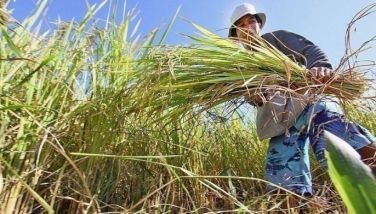Instant rice coffee now commercialized
January 9, 2005 | 12:00am
Ever tried instant rice coffee?
Yes, it’s now being commercialized.
It’s natural – no caffeine, no artificial flavor, no artificial color. It remedies gas pain, ulcer, and liver problems.
Last Christmas, we received a package of gifts, which included a plastic bottle (400 grams) of instant rice coffee.
The label carries the seal of the Nueva Ecija provincial government and it states that the item is a product of the Science City of Muñoz.
The proprietor: Leticia Basubas, one-time employee of the Muñoz-based Department of Agriculture-Philippine Rice Research Institute (DA-PhilRice).
One promotional line in the product’s label reads: "Ang sinaunang kape ng Pilipinas" (Philippine coffee of old).
Indeed, mention rice coffee and, to the country’s old folk, it immediately opens the floodgates of one’s memories to the hard times during the second World War when they made coffee out of dark-fried rice.
But in these times when the coffee industry has the best products to offer, some now conveniently in tea bags, rice coffee is gradually but consistently staging a comeback.
Basubas’ products come in such flavors as peanut, three-in-one (coffee with sugar and milk), and caramelized carabao milk.
Once fondly called "Rice Coffee Lady" by former Agriculture Secretary Luis Lorenzo Jr., Ms. Basubas remembers well those times when her grandmother used to serve her rice coffee every morning.
Upon opting for an early retirement a decade ago, she improved the traditional rice coffee.
Now, PhilRice noted, she is probably the only rice coffee maker in the country. The Department of Trade and Industry (DTI) and Bureau of Internal Revenue (BIR) have no records of other individuals or groups engaged in the same business.
Basubas now earns a good income from her product, reported Charisma Love Gado of PhilRice.
She first sold her product at the institute’s 14th anniversary celebration in 1999. Later, she consigned her rice coffee to a mall in Nueva Ecija.
The sell-out encouraged her to expand her business.
With the assistance of the Nueva Ecija provincial government headed by Gov. Tomas Joson III, PhilRice led by Executive Director Leocadio S. Sebastian, and DTI, her market grew as she now caters to the coffee needs to thousands of health buffs and 30 outlets in the province.
Her clients come from Pangasinan, Tarlac, Bulacan, and Manila. – Rudy A. Fernandez
Yes, it’s now being commercialized.
It’s natural – no caffeine, no artificial flavor, no artificial color. It remedies gas pain, ulcer, and liver problems.
Last Christmas, we received a package of gifts, which included a plastic bottle (400 grams) of instant rice coffee.
The label carries the seal of the Nueva Ecija provincial government and it states that the item is a product of the Science City of Muñoz.
The proprietor: Leticia Basubas, one-time employee of the Muñoz-based Department of Agriculture-Philippine Rice Research Institute (DA-PhilRice).
One promotional line in the product’s label reads: "Ang sinaunang kape ng Pilipinas" (Philippine coffee of old).
Indeed, mention rice coffee and, to the country’s old folk, it immediately opens the floodgates of one’s memories to the hard times during the second World War when they made coffee out of dark-fried rice.
But in these times when the coffee industry has the best products to offer, some now conveniently in tea bags, rice coffee is gradually but consistently staging a comeback.
Basubas’ products come in such flavors as peanut, three-in-one (coffee with sugar and milk), and caramelized carabao milk.
Once fondly called "Rice Coffee Lady" by former Agriculture Secretary Luis Lorenzo Jr., Ms. Basubas remembers well those times when her grandmother used to serve her rice coffee every morning.
Upon opting for an early retirement a decade ago, she improved the traditional rice coffee.
Now, PhilRice noted, she is probably the only rice coffee maker in the country. The Department of Trade and Industry (DTI) and Bureau of Internal Revenue (BIR) have no records of other individuals or groups engaged in the same business.
Basubas now earns a good income from her product, reported Charisma Love Gado of PhilRice.
She first sold her product at the institute’s 14th anniversary celebration in 1999. Later, she consigned her rice coffee to a mall in Nueva Ecija.
The sell-out encouraged her to expand her business.
With the assistance of the Nueva Ecija provincial government headed by Gov. Tomas Joson III, PhilRice led by Executive Director Leocadio S. Sebastian, and DTI, her market grew as she now caters to the coffee needs to thousands of health buffs and 30 outlets in the province.
Her clients come from Pangasinan, Tarlac, Bulacan, and Manila. – Rudy A. Fernandez
BrandSpace Articles
<
>
- Latest
Latest
Latest
November 9, 2024 - 3:43pm
By E.H. Edejer | November 9, 2024 - 3:43pm
June 9, 2024 - 5:55pm
By Alberto Peña | June 9, 2024 - 5:55pm
May 24, 2024 - 10:00am
May 24, 2024 - 10:00am
May 14, 2024 - 3:43pm
By Ian Laqui | May 14, 2024 - 3:43pm
April 10, 2024 - 5:12pm
By Ian Laqui | April 10, 2024 - 5:12pm
Recommended



























